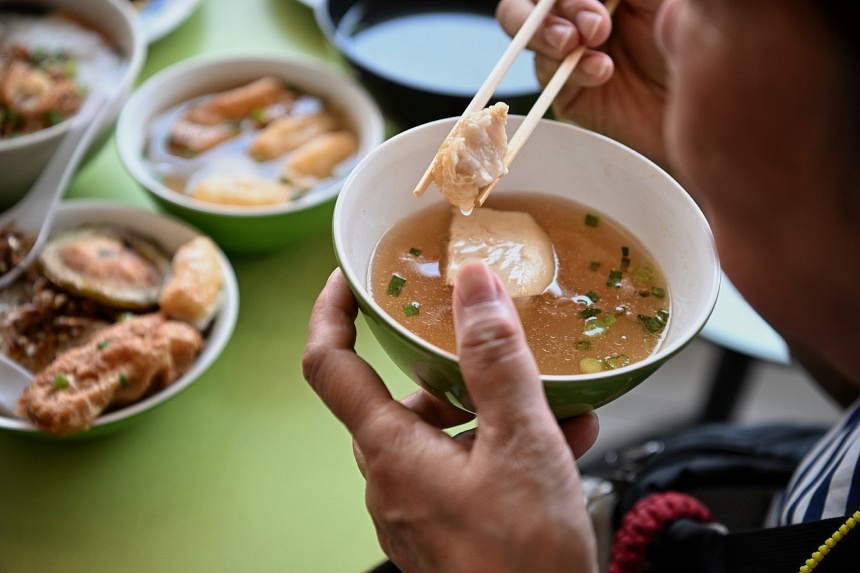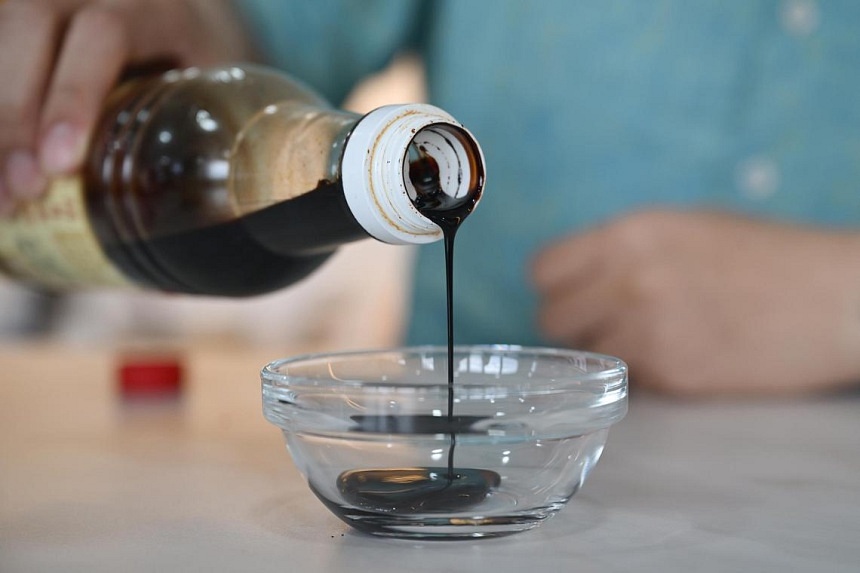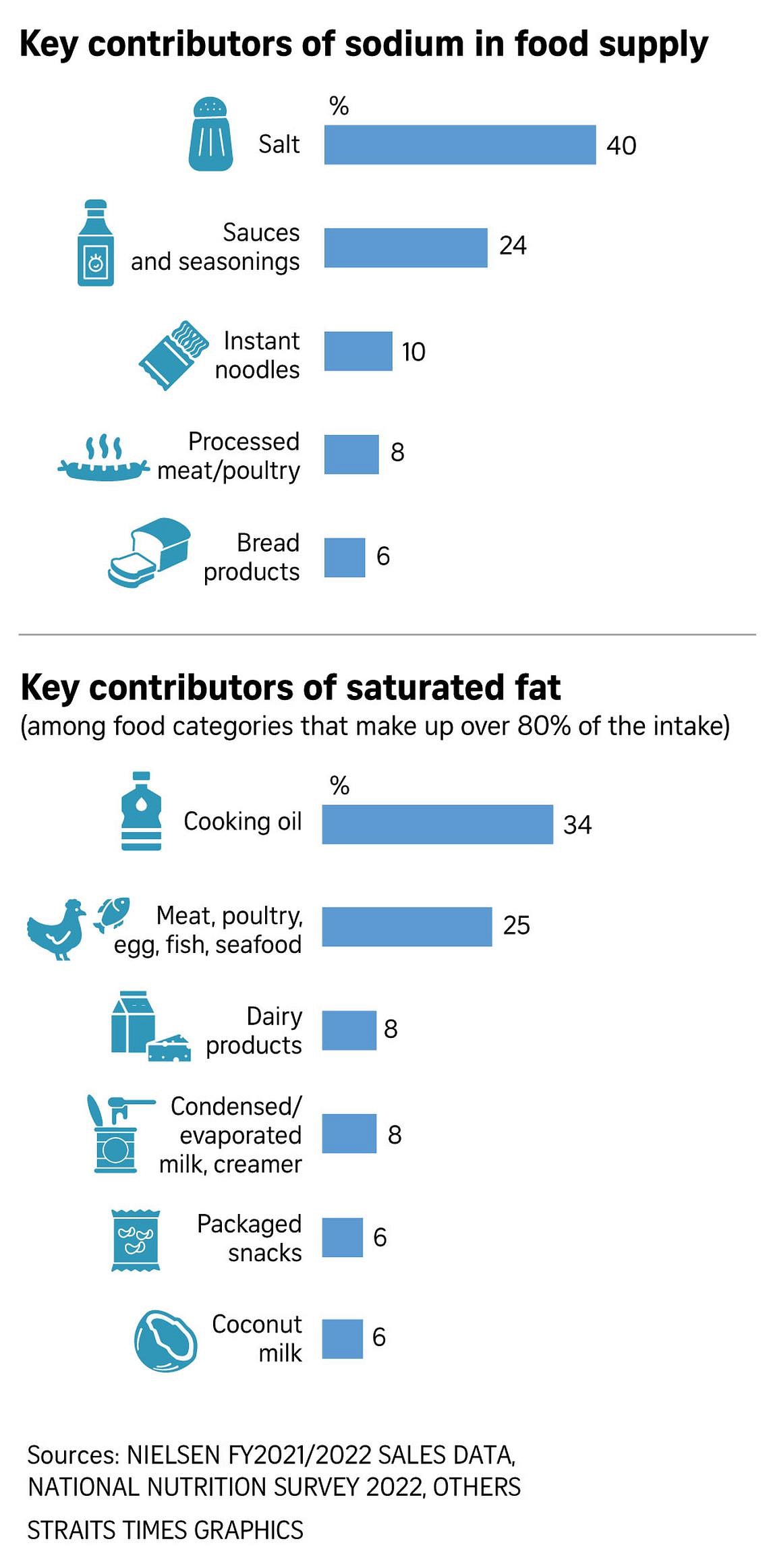Toggle navigation

Too much salt in the diet can cause high blood pressure, increasing the risk of cardiovascular diseases, among other illnesses. ST PHOTO: KUA CHEE SIONG

Joyce Teo
Senior Health Correspondent
Updated
Aug 22, 2024, 06:56 PM
FacebookTelegram
SINGAPORE – Singaporeans are overindulging in salt, sauces and seasonings, instant noodles and cooking oil, which can increase the risk of serious health issues such as heart attack and stroke. So these products will soon have to display the nutritional grades seen on their sugary counterparts to tell consumers at a glance how healthy these are.
Such products will be graded A to D – with D being the least healthy choice, having the highest levels of sodium and/or saturated fat, among other possible nutrients.
This follows the successful use of the mandatory Nutri-Grade label on pre-packaged and freshly prepared beverages. Drinks that exceed a threshold of sweetness are graded C and D, and there are also prohibitions on advertising such beverages that are grade D.
As a result of the labelling and advertising restrictions, Singaporeans are eating less sugar now.
“Many producers have reformulated their beverages to... suit the newly evolved taste. Labelling, I believe, has shaped the palate of the population with regard to sugar,” said Health Minister Ong Ye Kung in a speech at the World Organisation of Family Doctors Asia Pacific Regional Conference on Aug 22.
“So last year, over two thirds of pre-packaged beverages in the market were graded A and B, up from less than one-third five years ago.”
Welcoming the positive impact of the moves, the Ministry of Health (MOH) on Aug 22 said it will be extending Nutri-Grade labelling and advertising prohibitions to the four product groups – pre-packed salt, sauces and seasonings, instant noodles and cooking oil – the major culprits when it comes to the salt and saturated fat that people consume.

Get a round-up of the top stories to start your day
Sign up
By signing up, I accept SPH Media's Terms & Conditions and Privacy Policy as amended from time to time.
Yes, I would also like to receive SPH Media Group's
SPH Media Limited, its related corporations and affiliates as well as their agents and authorised service providers.
marketing and promotions.
Since healthier alternatives to such ingredients and foods are already available, they should be labelled, said Mr Ong.
“This means that we should expect, in time to come, soya sauce, chilli sauce, sambal, cooking oil, instant noodles, et cetera, that are sold in supermarkets to carry Nutri-Grade labels,” said Mr Ong.
Many industry players have begun producing healthier choices. MOH said it will be conducting further consultations with the industry to work out the details, including the nutrient thresholds for the labelling, which will focus on sodium and saturated fat. It will provide ample time for the industry to adjust to the labelling rules.
Salt, also known as sodium chloride, is about 40 per cent sodium and 60 per cent chloride, while saturated fat is a dietary fat that is typically solid at room temperature. Foods like butter, palm and coconut oils, cheese and red meat have high amounts of saturated fat.
Too much salt in the diet can cause high blood pressure, increasing the risk of cardiovascular diseases, among other illnesses, while excessive dietary fat intake has been linked to increased risk of obesity, coronary heart disease and certain types of cancer.
In Singapore, the prevalence of hypertension in Singapore is rising, from 24 per cent to 37 per cent over the last five years. The prevalence of hyperlipidaemia (high cholesterol) is also worryingly high, with about a third of Singapore residents having the condition, said Mr Ong.
Both conditions are significant risk factors for heart disease and the two key nutrients that can lead to these diseases are sodium and saturated fat, and Singapore residents are overconsuming them, he said.
More On This Topic
Family doctors can become specialists; clinics, hospitals must join national health record scheme
More S’poreans exercising, getting their shots; fewer smoking in 2023
Singapore already has the Healthier Choice symbols for food. They cover more than 100 food categories, including beverages, sauces, rice and bread.
For instance, there are more than 500 lower-sodium sauces and seasonings labelled with the Healthier Choice symbol. However, these are voluntary labels and do not help consumers to identify the products that may be graded C and D under Nutri-Grade labelling.
The Nutri-Grade label, with its alphabet categories, makes it easier for consumers to interpret the level of sugar, sodium or saturated fat, said Professor Teo Yik Ying, vice-president for global health and dean of the NUS Saw Swee Hock School of Public Health.
Beyond labelling the ingredients, Mr Ong said the authorities also want to help consumers identify eateries and stalls that produce healthy dishes.
“We should adopt a voluntary approach, at least as a start,” he said. Hence, eateries that use healthier ingredients or less salt or sauces can apply to the Health Promotion Board (HPB) to display shopfront labels to inform consumers of that.

There are more than 500 lower-sodium sauces and seasonings labelled with the Healthier Choice symbol. ST PHOTO: AZMI ATHNI
Acknowledging that the move can reshape consumer behaviour and drive innovative product reformulation, Singapore Nutrition and Dietetics Association president Kalpana Bhaskaran said consumers benefit when they know for sure if they have purchased a healthier product.
For instance, when it comes to cooking oils, advertisements can be misleading, she said. Having a mandatory labelling system will make it easier for consumers to choose a healthier product.
Dr Kalpana, who heads the Glycemic Index Research Unit at Temasek Polytechnic, also said the labelling for instant noodles will help to nudge food manufacturers to reformulate their products to make them healthier. Currently, less than 5 per cent of instant noodles are healthier choices.
Meanwhile, the HPB said it will further intensify its public education efforts. It started a new programme on July 24 to not just educate hawkers on the need to cut down on sodium, but also to offer them samples of lower-sodium products and connect them with suppliers that are selling these products in the wholesale market.
HPB said it has already engaged 40 hawker centres – out of a target of 60 in 2024 – and will go to another 50 hawker centres in 2025.

Its market research shows that the sodium content of dishes went up by an average of 20 per cent between 2010 and 2023. About 31 per cent of dine-out dishes contain more than the daily recommended 2,000mg of sodium.
For instance, a bowl of lor mee can have 3,500mg of sodium, while a bowl of mee soto can have 3,700mg of sodium.
In reminding people to use less salt, sauces and seasonings, Mr Ong said recently that Singaporeans are equating saltiness with tastiness, but there is so much more to taste than just the level of seasoning.
The latest move in the war on salt comes as Singapore undertakes to steer the nation onto a path of prevention, so that citizens live longer and healthier lives and the burden on healthcare resources is reduced.
It was timed with MOH’s Aug 22 release of the results of the National Population Health Survey 2023, which showed that there was an increase in Singaporeans’ total physical activity, among other improvements.
Ms Rachel Yeo, who cooks for her family of four twice or thrice a week, is already looking forward to seeing the Nutri-Grade labels for salt, sauces and oils in the shops.
“I like the Nutri-Grade indication for sugar, which helps me to decide what drinks to buy,” she said.
“With a similar rating for salt and oil, it helps me to decide whether I should buy that product. I will steer away from products with grade C or D rating, unless I ‘die-die’ must try.”
War on salt, sauces, instant noodles, cooking oil: These will have A to D grades like beverages

Too much salt in the diet can cause high blood pressure, increasing the risk of cardiovascular diseases, among other illnesses. ST PHOTO: KUA CHEE SIONG

Joyce Teo
Senior Health Correspondent
Updated
Aug 22, 2024, 06:56 PM
FacebookTelegram
SINGAPORE – Singaporeans are overindulging in salt, sauces and seasonings, instant noodles and cooking oil, which can increase the risk of serious health issues such as heart attack and stroke. So these products will soon have to display the nutritional grades seen on their sugary counterparts to tell consumers at a glance how healthy these are.
Such products will be graded A to D – with D being the least healthy choice, having the highest levels of sodium and/or saturated fat, among other possible nutrients.
This follows the successful use of the mandatory Nutri-Grade label on pre-packaged and freshly prepared beverages. Drinks that exceed a threshold of sweetness are graded C and D, and there are also prohibitions on advertising such beverages that are grade D.
As a result of the labelling and advertising restrictions, Singaporeans are eating less sugar now.
“Many producers have reformulated their beverages to... suit the newly evolved taste. Labelling, I believe, has shaped the palate of the population with regard to sugar,” said Health Minister Ong Ye Kung in a speech at the World Organisation of Family Doctors Asia Pacific Regional Conference on Aug 22.
“So last year, over two thirds of pre-packaged beverages in the market were graded A and B, up from less than one-third five years ago.”
Welcoming the positive impact of the moves, the Ministry of Health (MOH) on Aug 22 said it will be extending Nutri-Grade labelling and advertising prohibitions to the four product groups – pre-packed salt, sauces and seasonings, instant noodles and cooking oil – the major culprits when it comes to the salt and saturated fat that people consume.

Get a round-up of the top stories to start your day
Sign up
By signing up, I accept SPH Media's Terms & Conditions and Privacy Policy as amended from time to time.
Yes, I would also like to receive SPH Media Group's
SPH Media Limited, its related corporations and affiliates as well as their agents and authorised service providers.
marketing and promotions.
Since healthier alternatives to such ingredients and foods are already available, they should be labelled, said Mr Ong.
“This means that we should expect, in time to come, soya sauce, chilli sauce, sambal, cooking oil, instant noodles, et cetera, that are sold in supermarkets to carry Nutri-Grade labels,” said Mr Ong.
Many industry players have begun producing healthier choices. MOH said it will be conducting further consultations with the industry to work out the details, including the nutrient thresholds for the labelling, which will focus on sodium and saturated fat. It will provide ample time for the industry to adjust to the labelling rules.
Salt, also known as sodium chloride, is about 40 per cent sodium and 60 per cent chloride, while saturated fat is a dietary fat that is typically solid at room temperature. Foods like butter, palm and coconut oils, cheese and red meat have high amounts of saturated fat.
Too much salt in the diet can cause high blood pressure, increasing the risk of cardiovascular diseases, among other illnesses, while excessive dietary fat intake has been linked to increased risk of obesity, coronary heart disease and certain types of cancer.
In Singapore, the prevalence of hypertension in Singapore is rising, from 24 per cent to 37 per cent over the last five years. The prevalence of hyperlipidaemia (high cholesterol) is also worryingly high, with about a third of Singapore residents having the condition, said Mr Ong.
Both conditions are significant risk factors for heart disease and the two key nutrients that can lead to these diseases are sodium and saturated fat, and Singapore residents are overconsuming them, he said.
Family doctors can become specialists; clinics, hospitals must join national health record scheme
More S’poreans exercising, getting their shots; fewer smoking in 2023
Singapore already has the Healthier Choice symbols for food. They cover more than 100 food categories, including beverages, sauces, rice and bread.
For instance, there are more than 500 lower-sodium sauces and seasonings labelled with the Healthier Choice symbol. However, these are voluntary labels and do not help consumers to identify the products that may be graded C and D under Nutri-Grade labelling.
The Nutri-Grade label, with its alphabet categories, makes it easier for consumers to interpret the level of sugar, sodium or saturated fat, said Professor Teo Yik Ying, vice-president for global health and dean of the NUS Saw Swee Hock School of Public Health.
Beyond labelling the ingredients, Mr Ong said the authorities also want to help consumers identify eateries and stalls that produce healthy dishes.
“We should adopt a voluntary approach, at least as a start,” he said. Hence, eateries that use healthier ingredients or less salt or sauces can apply to the Health Promotion Board (HPB) to display shopfront labels to inform consumers of that.

There are more than 500 lower-sodium sauces and seasonings labelled with the Healthier Choice symbol. ST PHOTO: AZMI ATHNI
Acknowledging that the move can reshape consumer behaviour and drive innovative product reformulation, Singapore Nutrition and Dietetics Association president Kalpana Bhaskaran said consumers benefit when they know for sure if they have purchased a healthier product.
For instance, when it comes to cooking oils, advertisements can be misleading, she said. Having a mandatory labelling system will make it easier for consumers to choose a healthier product.
Dr Kalpana, who heads the Glycemic Index Research Unit at Temasek Polytechnic, also said the labelling for instant noodles will help to nudge food manufacturers to reformulate their products to make them healthier. Currently, less than 5 per cent of instant noodles are healthier choices.
Meanwhile, the HPB said it will further intensify its public education efforts. It started a new programme on July 24 to not just educate hawkers on the need to cut down on sodium, but also to offer them samples of lower-sodium products and connect them with suppliers that are selling these products in the wholesale market.
HPB said it has already engaged 40 hawker centres – out of a target of 60 in 2024 – and will go to another 50 hawker centres in 2025.

Its market research shows that the sodium content of dishes went up by an average of 20 per cent between 2010 and 2023. About 31 per cent of dine-out dishes contain more than the daily recommended 2,000mg of sodium.
For instance, a bowl of lor mee can have 3,500mg of sodium, while a bowl of mee soto can have 3,700mg of sodium.
In reminding people to use less salt, sauces and seasonings, Mr Ong said recently that Singaporeans are equating saltiness with tastiness, but there is so much more to taste than just the level of seasoning.
The latest move in the war on salt comes as Singapore undertakes to steer the nation onto a path of prevention, so that citizens live longer and healthier lives and the burden on healthcare resources is reduced.
It was timed with MOH’s Aug 22 release of the results of the National Population Health Survey 2023, which showed that there was an increase in Singaporeans’ total physical activity, among other improvements.
Ms Rachel Yeo, who cooks for her family of four twice or thrice a week, is already looking forward to seeing the Nutri-Grade labels for salt, sauces and oils in the shops.
“I like the Nutri-Grade indication for sugar, which helps me to decide what drinks to buy,” she said.
“With a similar rating for salt and oil, it helps me to decide whether I should buy that product. I will steer away from products with grade C or D rating, unless I ‘die-die’ must try.”

